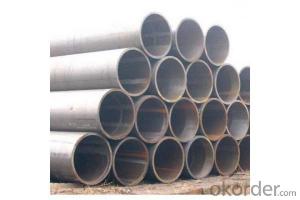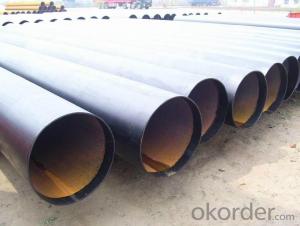API SSAW LSAW CARBON STEEL PIPE LINE OIL GAS PIPE 32'' 48'' 56'' 60''
- Loading Port:
- Tianjin
- Payment Terms:
- TT OR LC
- Min Order Qty:
- 5 m.t.
- Supply Capability:
- 3000 m.t./month
OKorder Service Pledge
OKorder Financial Service
You Might Also Like
Packaging & Delivery
Packaging Detail: | standard export packing or as customer's requirement |
Delivery Detail: | within 10 - 30 days |
Specifications
Spiral Welded Steel Pipes and Tubes
1.Material:Q195-Q235
2.Length:1-12m
3.WT:1.0-14mm
4.O.D.:20-273mm
Spiral Welded Steel Pipes and Tubes
Product Description:
1.Material : Q235,Q345,L245,L290,L360,L415,L450,L485,GrB,X42,46,X52,X56,X60,X65,X70,X80,X100
2,Standard: SY/T5037-2000,GB/T9711-2011,API Spec 5L PSL1/PSL2,ASTM A252\A53,ISO3183,DIN17172,EN10217,JIS G3457,AWWA C200,ASTM A139,ASTM A671,ASTM A672
3.Wall thickness: 3.0mm-30mm
4.Outer diameter: φ168mm-3020mm
5,Length: 5m-12m or as your requirement
6,Corrosion protection standard: DIN30670,DIN30671, AWWAC210, AWWA C203, SY/T0413-2002,SY/T0414-2002
7,Application: Oil, gas, natural gas, water pipe, thermal electricity pipe, steel structure engineering, etc
Q195-q345 Material Steel Pipe's Materials
Elements | Chemical Compsition% | Mechanical Property | ||||||
C% | Mn% | S% | P% | Si% | Yield Point (Mpa) | Tensile Strength(Mpa) | Elongation | |
Q195 | 0.06-0.12 | 0.25-0.50 | <0.050< span=""> | <0.045< span=""> | <0.030< span=""> | >195 | 315-430 | 32-33 |
Q215 | 0.09-0.15 | 0.25-0.55 | <0.05< span=""> | <0.045< span=""> | <0.030< span=""> | >215 | 335-450 | 26-31 |
Q235 | 0.12-0.20 | 0.30-0.70 | <0.045< span=""> | <0.045< span=""> | <0.030< span=""> | >235 | 375-500 | 24-26 |
Q345 | <0.20< span=""> | 1.0-1.6 | <0.040< span=""> | <0.040< span=""> | <0.55< span=""> | >345 | 470-630 | 21-22 |
Packaging & Delivery
Packaging Detail: | Normal exporting packing,in container or bulk vessel or as per clients' request |
Delivery Detail: | 2 months after confimed contract |
Specifications
Large Diameter API 5L X70 PSL2 LSAW Steel Pipe
Grade: X42, X46, X50, X52, X60, B, C
OD: 1.5"-28"
WT: SCH10-SCH160
Large Diameter API 5L X70 PSL2 LSAW Steel Pipe
Specifications:
u Standard: API 5L
u Grade: B, C, X42, X46, X50, X52, X56, X60, X65, X70, X80
u OD: 1.5"-28"
u WT: SCH10-SCH160
u Length: 5-12m
u Ends Finish: plain end, bevel end, grooved end
u Surface Treatment: bare, black varnished, oiled finish, red color, anti-corrosion, 3PE, FBE or epoxy coating
u Technique: hot rolled or cold drawn
u Application: api 5l steel pipe for conveying oil, water, gas
u Invoicing: based on theoretical weight or actual weight
u Payment Terms: L/C at sight, T/T or Western Union
u Trade Terms: FOB, CFR, CIF
u Certification: ABS manufacturing assessment, ABS design assessment, API 5CT, API 5L, DNV manufacturer certificate, ISO9001 quality management system certificate, ISO14001 environment management system certificate, GB/T28001 occupational health and safety management system certificate, A1 class manufacturing license of special equipment certificate, CCS, GL, LR, SGS, TüV, PDE
- Q:How are steel pipes used in the construction of buildings?
- Steel pipes are commonly used in the construction of buildings for various purposes such as structural support, plumbing, and electrical installations. They provide strength and durability, allowing for the construction of high-rise buildings and large-scale structures. Steel pipes are used to create the framework of the building, forming the skeleton that supports the weight and load of the structure. Additionally, steel pipes are used for plumbing systems, effectively transporting water and sewage throughout the building. They are also used for electrical installations, providing a safe and efficient conduit for wiring. Overall, steel pipes play a crucial role in the construction of buildings, ensuring stability, functionality, and longevity.
- Q:What is the role of steel pipes in the construction of stadiums?
- Steel pipes play a crucial role in the construction of stadiums as they are used for various purposes including structural support, drainage systems, and the installation of utilities such as water, gas, and electrical lines. These pipes provide the necessary strength and durability to support the weight of the stadium's roof, seating areas, and other infrastructure. Additionally, steel pipes enable efficient transportation of liquids and gases, ensuring proper functioning of the stadium's facilities.
- Q:What is the difference between steel pipes and cast iron pipes?
- The main difference between steel pipes and cast iron pipes is the material they are made of. Steel pipes are made from an alloy of iron and carbon, making them stronger and more durable. On the other hand, cast iron pipes are made solely from iron, which makes them more brittle and prone to cracks. Additionally, steel pipes have a smoother interior surface, allowing for better water flow and reducing the chance of clogs. Cast iron pipes, on the other hand, have a rougher interior surface and are more susceptible to corrosion. Overall, steel pipes are typically preferred for their strength and longevity, while cast iron pipes may be used in specific applications where their unique properties are advantageous.
- Q:How many meters per ton of steel tube?
- General scaffolding tube diameter 40mm, specifications specify wall thickness of 3.5mm, the actual wall thickness of 3.2 - 3.4mm.The theoretical weight per meter is 3.85kg and the wall thickness is 3mm.Hence a ton of steel is about 260m.
- Q:What's the use of steel pipe?
- No other type of steel can replace the steel tube entirely, but the steel tube can take the place of some sections and bars. Steel pipe is very important to the development of national economy and the improvement of human life quality, much better than other steel products. From the people's daily utensils, furniture, water supply and drainage, gas supply, ventilation and heating facilities to all kinds of agricultural machinery equipment manufacturing, underground resources development, national defense and space use guns, bullets, missiles, rockets and so cannot do without steel.
- Q:What are the different types of steel pipe fittings for gas pipelines?
- There are several types of steel pipe fittings commonly used for gas pipelines, including elbows, tees, reducers, flanges, and couplings. Elbows are used to change the direction of the pipeline, while tees are used to create branch connections. Reducers are used to connect pipes of different sizes, and flanges are used for connecting pipes with valves or other equipment. Couplings are used to join two pipes together.
- Q:How are steel pipes protected against soil movement or settlement?
- Various methods can be employed to safeguard steel pipes against soil movement or settlement. One prevalent approach involves the utilization of protective coatings on the pipes, which act as a barrier between the steel and the soil. By preventing direct contact and reducing the chance of corrosion, these coatings offer effective protection. Epoxy, polyethylene, and zinc are among the coatings commonly employed for this purpose. Another method entails the implementation of cathodic protection. This technique involves the installation of sacrificial anodes along the pipeline. These anodes corrode instead of the steel pipes, thus shielding them from potential harm caused by soil movement or settlement. Furthermore, ensuring proper design and installation techniques is crucial for protecting steel pipes in these scenarios. Engineers must take into account factors such as soil composition, slope stability, and the likelihood of ground movement when designing the pipeline route. Additionally, employing appropriate trenching and bedding techniques guarantees adequate support and protection against settlement. Regular inspection and maintenance play a crucial role in protecting steel pipes against soil movement or settlement. By monitoring the condition of the pipeline, including the protective coatings and cathodic protection systems, potential issues can be identified promptly, allowing for timely repairs or replacements. In conclusion, a combination of protective coatings, cathodic protection, proper design and installation techniques, and regular maintenance effectively safeguards steel pipes from soil movement or settlement.
- Q:What are the different types of steel pipe supports?
- There are several types of steel pipe supports, including pipe hangers, pipe clamps, pipe saddles, pipe brackets, and pipe supports with rollers.
- Q:How do you protect steel pipes from rusting?
- Steel pipes can be protected from rusting by applying a protective coating such as paint or zinc coating. Additionally, using corrosion inhibitors, maintaining proper drainage, and keeping the pipes dry can help prevent rust formation. Regular inspection and maintenance are also crucial to identify and address any potential issues before they escalate.
- Q:How are steel pipes used in bridge construction?
- Steel pipes are commonly used in bridge construction for various purposes. They are often used as piles to provide structural support to the bridge foundation, ensuring stability against soil movement and water pressure. Additionally, steel pipes are used as structural components in the bridge's superstructure, such as for trusses and beams, due to their high strength and durability. Steel pipes also play a crucial role in carrying utilities, such as water and gas pipelines, across the bridge. Overall, steel pipes are an essential element in bridge construction, providing strength, stability, and functionality to the structure.
1. Manufacturer Overview |
|
|---|---|
| Location | |
| Year Established | |
| Annual Output Value | |
| Main Markets | |
| Company Certifications | |
2. Manufacturer Certificates |
|
|---|---|
| a) Certification Name | |
| Range | |
| Reference | |
| Validity Period | |
3. Manufacturer Capability |
|
|---|---|
| a)Trade Capacity | |
| Nearest Port | |
| Export Percentage | |
| No.of Employees in Trade Department | |
| Language Spoken: | |
| b)Factory Information | |
| Factory Size: | |
| No. of Production Lines | |
| Contract Manufacturing | |
| Product Price Range | |
Send your message to us
API SSAW LSAW CARBON STEEL PIPE LINE OIL GAS PIPE 32'' 48'' 56'' 60''
- Loading Port:
- Tianjin
- Payment Terms:
- TT OR LC
- Min Order Qty:
- 5 m.t.
- Supply Capability:
- 3000 m.t./month
OKorder Service Pledge
OKorder Financial Service
Similar products
New products
Hot products
Related keywords






























